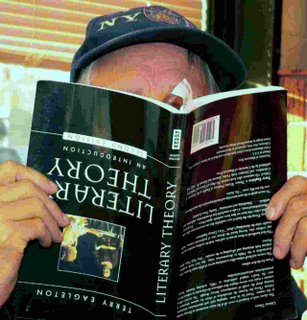Selling Used Books : One Bookstore out of a Handful
BELOW you will find an almost stream of consciousness RANT on what I think has to be taken into consideration about the book market in order to survive and pay the rent. Frankly, I see the whole thing going to hell in a handbasket. Forget any religion about good books, good authors or even good publishers and titles. You have obviously realized this true-ism (like all other -isms) yourself or you would not be offering books for sale about dead technologies and discredited theories that appeal to deader disciplines. Quality is out and the obscure is in -- let's face it!
In my rant, toward the end of it, I focus on the demographics of Montreal culture. But you and I can agree that whatever insights we can arrive at about the global or local demographics means shit-all without communicating a message to the masses -- a line of communication which equals some sort of advertising -- some form of communication other than what can be achieved in an item or keyword search on an Internet browser.
What I abhor the most is the stuckness of spinning my wheels in mud. (I never did have much confidence that by simply standing up for what's right and good in literature or politics that somehow, time will tell, I shall be proven right and then find myself re-energized by the next cultural wave -- some 60s dynamic of social upheaval and contestation.)
So, as regards the marketing of printed material both on the Internet and within the 4 square walls of where I work, we are always back to square one, circa 50 years ago. The bookstore owner here acts like the 60s are coming back. But the owner also has a strong competitive streak and authoritarian personality. Can the store survive with a personality like that running the show? That is the big question.
Book-lovers collect them, pay for them, read them, go out of their way to find them, or take out a library card and borrow them. Unfortunately, the 'lovers of books' as collectors created a bubble in the online market that lasted, at most, 5 years. The bubble . . . something of a fad mentality . . . lasted from circa 1998 to 2003, like a hoola-hoop fad, via search engines like ABE on the Internet. All ships rose in the high tide (if they put their stock online) as Internet 'shopping' grew and even Amazon went into the used-book trade.
Has Internet shopping since moved on to Internet auctions . . . or to Internet downloads of e-books? According to my first and last customer, indeed it has. He downloaded a PDF from his instructor in lieu of buying the hardcopy text I could have delivered within 3 or 4 days. (I even thought of the possibility of this myself: the play is so short I could have scanned it into a PDF overnight and uploaded it to my blog . . . in total violation of the clearly marked copyright notice prominently displayed on the printed copy I offered to sell hardcopy in the first place!)
The worst case scenario is just that -- the ease with which printed matter is transformed into a digital signal of little commercial value . . . In other words, an Internet file which can be directly up- and down-loaded has cast the hand-holdable (hard) copy aside for the online customer. The potential buyer for the used book and document seller is a buyer of nostalgia. It is only 'nostalgia' that says that some 33 1/3 vinyl recording has intrinsic value 'for the connoisseur's ear'. Yet nostalgic buying is on the wane. All the messages getting through to the public are saying that 'the best quality' is in a digital copy. With this shift, with such a transformation in the collective mindset, who is left to pay cash or credit for the real thing, for what only the bookseller can offer through the mail?
Why must I meticulously downgrade whatever holdings I have scrupulously secured as inventory within the bowels of my basement storage area? What is hard copy worth when buyers have moved on to the realm of digital imaging?
Is the ultimate winner the book dealer who goes to all lengths imaginable to provide truth in purchasing online? Who jumps through hoops?
Antiquarian dealers now transform themselves for the virtual market into drudges who fill in a computer form for each-and-every item being offered for sale through the Internet online go-between website (which charges self-same antiquarian a 15 or 20% commission for the privilege of raiding his larder of books). And the prices fall, they book values plummet. These antiquarians are on an equal footing with the tag-price book maven and the casual shopper at the Salvation Army who is armed with a computer at home. Everybody is quickly transformed into a a seller in a buyers' market.
Who benefits the most? Isn't there an element of hucksterism here, some New Age embodiment of the Mid-Western American booster mentality? This was so thoroughly exposed through the mid 20th century novels of Sinclair Lewis. Should we take this Nobel Prize winner off our shelves in self pity and in self shame and self loathing? Yet there are 121 copies of Lewis novels online at as low as $1 plus handling and shipping. Even the one who exposed it all in the beginning is grist for the Internet buying mill.
And title by title the bookseller can react with nothing more than warehousing the titles he or she can accumulate and store securely while filling out a computerised fiche on each one an uploading the graded descriptive entry to 3 or 4 competing online book brokers. These book store proprietors, some of which have closed their store to concentrate exclusively on the Internet market, have become so reliable that the brokers just take them for granted while they concentrate on the book martkets, such as textbooks and publishers overstocks, which represent a new challenge for competition and capture.
The user has a bargain, Every potential buyer loves having a detailed guarantee regarding each and every hand-holdable item, each and every 'artifact' and collectable first edition item in terms of the item's quality and price. Who wouldn't love requiring every merchant to prove that their little store has earned its place in even the weirdest market of dollar store and millionaire club offerings? But only, it seems, do the tradition booksellers comply. Booksellers want to better or equal "mom and pop's" impeccable record of delivering the goods faster than the postal services or UPS ... and send out each book with a family smile printed on some handmade brochure or implied on the content posted on both a webpage and in an Internet blog.
Another way to pose the questions: Has the cost and care it takes to maintain a warehouse of books, periodicals, sundry documents, long-playing records, prints, catalogues, broadsheets and chapbooks become a worthless burden . . . a way of selling appearances on the cheap . . . are basically community-minded people becoming another Internet adjunct to popularity. Is their talent something they have sold on the cheap while taking on all the costs incurred as the wages for maintaining home-grown, locally earned collections that reflect the old-time values of collectors in their communities who trusted them as carekeepers and local dealers. Has the devaluation of these collections gone beyond any reasonable limit?
Are we the local bookstores now inhabiting some ash heap alongside thousands of other small-bit players in the Salvation Army of booksellers, boutique operators and rare book dealers who have flown the nest of local trade for this virtual world of global opportunity?
Are we the shop owners and employees the ones (subsequently and therefore) reduced to some new status of near total dependency upon a largesse that is controlled by Internet hucksters? Did we become easy targets for new-style speculators? Were we sold aluminum siding, only this time around it came in an IKEA kit reqauiring constant upkeep and repair. Have the bricks and mortar people bowed and cowed down to promises of a putative, enormous worldwide 'customer base' if they would only put up this new siding? Is it only the search-engine monopolies on the Internet who can "deliver value" as long as we do the up-keep? Are the digital marketers the only corporate 'persons' online, while we disappear in their shadow? Are instant downloads the next sidebar explaining how and when real books disappeared? Do we as bookstores and book dealers only exist if and when we emerge (morph into) the the million-member blogosphere? Should every store owner becomea weblog personality drugged on caffeine and a daily keyboard routine? Must we universally provide a link to some corporate publisher - some Amazon-like mega site which promises to bring in sales and customers at a 15 to 20 percent commission?
Must we never reveal publicly the hand-to-mouth real-world existence this confronts us with daily as our book holdings and even our personal libraries are reduced to a rubble of what they once were, what we once valued them for? (Who would admit it was a dollar figure in the back of their head when discussing literature or science?) When the books we prized now amount to unmarketable pieces of shit on the Internet, it does seem an appropriate moment for us to just keep our collective mouths shut. Don't blurt out an unseemly truth. Pretend we did not even look up the book online to see what we could sell it for. All our educated metaphors are being stretched beyond the limit of our individual ability to comprehend what is happening . . . and, worse, we are muddled about what is to be done to survive and to keep valuing the practise of reading! Why did we get into books in the first place?



No comments:
Post a Comment